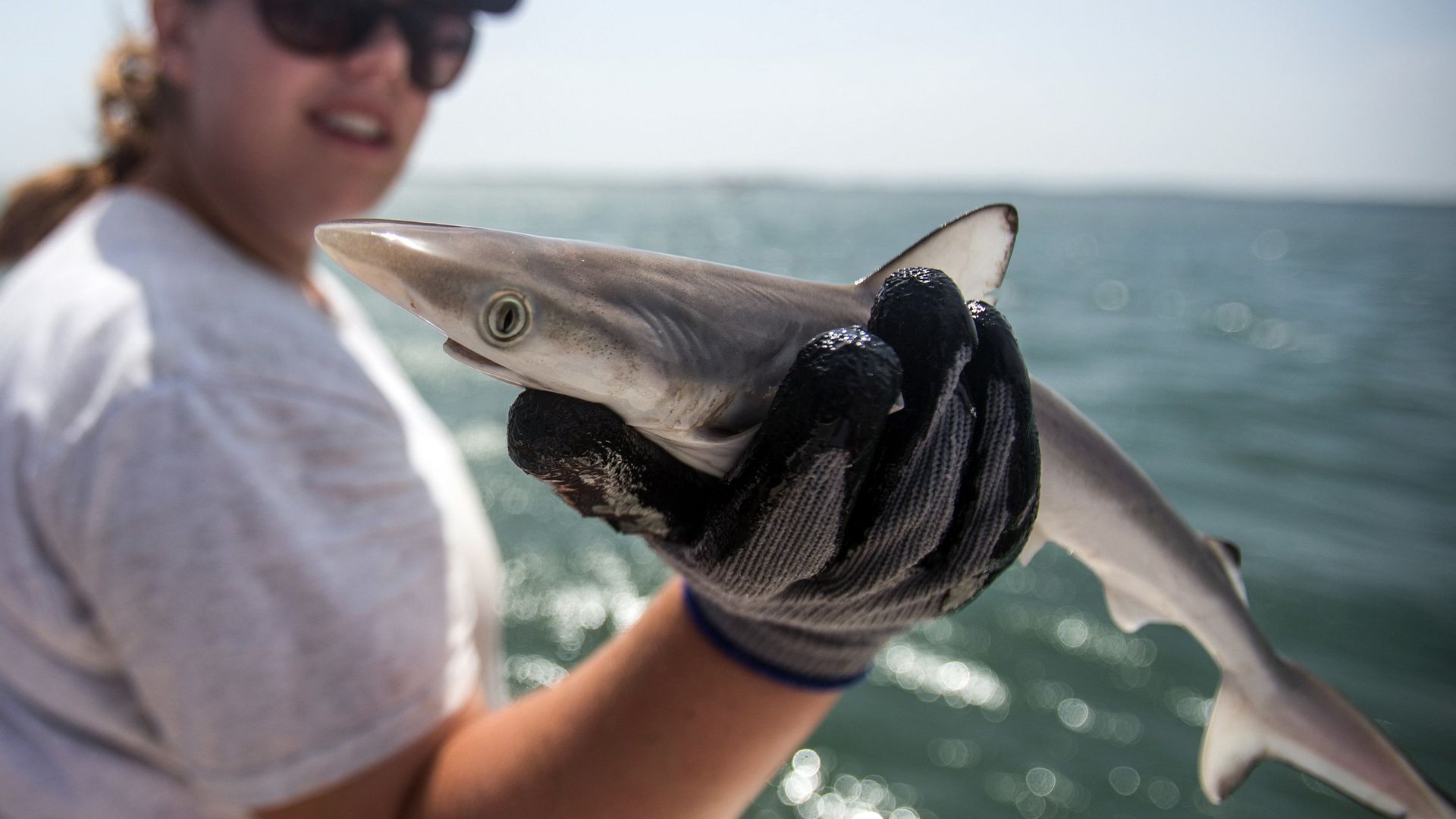
Cocaine discovered in sharks off of coast of Brazil, study hopes to explain why
By Lauren Taylor (Anchor), Evan Hummel (Producer), Jake Maslo (Video Editor)
Marine biologists announced on Tuesday, July 23, that sharks off of the coast of Brazil have tested positive for high levels of cocaine. The scientists tested 13 Brazilian sharp nose sharks caught on the shores near Rio de Janeiro and found the fish had high levels of cocaine in their muscles and livers.
Media Landscape
See how news outlets across the political spectrum are covering this story. Learn moreBias Distribution
Left
Right
Untracked Bias
Researchers said they believe the cocaine entered the sharks’ bodies after making its way into the ocean through illegal labs that manufactured cocaine and drug users’ biological waste. Scientists also said that packs of cocaine dumped or lost by drug trafficker into the sea could be a source, though it’s a less likely cause.
Brazil is one of the world’s largest suppliers of cocaine and has poor sewage infrastructure, according to the researchers. Scientists said that is a major reason they are seeing increased levels of cocaine in the sea.

Download the SAN app today to stay up-to-date with Unbiased. Straight Facts™.
Point phone camera here
The higher concentrations of cocaine sharks likely mean they’re consuming sea creatures with the drug already in them, according to the study. Researchers now believe that cocaine is getting into the human food supply. Brazilian sharp nose sharks are sold in Brazil at markets, meaning people may already being consuming the cocaine-riddled fish.
The impact on marine life is still being researched, but scientists say all of the female sharks involved in the study were pregnant. It’s unclear what impact the presence of cocaine may have on their offspring.
As far as the effects of cocaine on shark behavior, studies have shown it to have side effects similar to those humans’ experience.
Unbiased news.
Directly to your inbox. Free!
Learn more about our emails. Unsubscribe anytime.
By entering your email, you agree to the Terms & Conditions and acknowledge the Privacy Policy.
The team involved in the study said it hopes to expand its research to other shark species. The reason the Brazilian sharp nose shark was chosen is because of its small size and also due to the fact that it lives in a small area where it is exposed to large amounts of contaminant discharges, according to scientists.
[LAUREN TAYLOR]
MAYBE YOU’VE HEARD OF THE MOVIE “COCAINE BEAR?”
“COCAINE BEAR” MEET “COCAINE SHARK” … OR SHARKS… BUT THIS ISN’T FICTION AND IT MAY BE CAUSE FOR CONCERN AMONG HUMANS AND MARINE LIFE.
13 SHARKS OFF OF THE COAST OF BRAZIL TESTED POSITIVE FOR HIGH LEVELS OF COCAINE.
MARINE BIOLOGISTS FOUND IT IN THE MUSCLES AND LIVERS OF BRAZILIAN SHARPNOSE SHARKS.
SO, HOW DID IT GET THERE?
RESEARCHERS BELIEVE THE COCAINE IS MAKING ITS WAY INTO THE OCEAN THROUGH ILLEGAL COCAINE LABS AND DRUG USERS’ BIOLOGICAL WASTE.
THEY ALSO SAY PACKS OF COCAINE DUMPED OR LOST BY TRAFFICKERS INTO THE SEA COULD BE A SOURCE– THOUGH LESS LIKELY.
BRAZIL IS ONE OF THE WORLD’S LARGEST SUPPLIERS OF COCAINE AND HAS POOR SEWAGE INFRASTRUCTURE– WHICH RESEARCHERS SAY IS LEADING TO INCREASED LEVELS OF THE DRUG IN THE SEA.
HIGHER COCAINE CONCENTRATIONS IN SHARKS LIKELY MEANS THEY’RE CONSUMING SEA CREATURES WITH THE DRUG ALREADY IN THEM. NOW RESEARCHERS BELIEVE COCAINE IS GETTING INTO THE HUMAN FOOD SUPPLY.
BRAZILIAN SHARPNOSE SHARKS ARE SOLD IN BRAZIL AT MARKETS– MEANING PEOPLE MAY ALREADY BE CONSUMING THE COCAINE-RIDDLED FISH.
THE IMPACT ON MARINE LIFE IS STILL BEING RESEARCHED– BUT SCIENTISTS SAY ALL OF THE FEMALE SHARKS THEY STUDIED WERE PREGNANT– AND IT’S UNCLEAR WHAT IMPACT THAT COULD HAVE ON THEIR OFFSPRING.
AS FAR AS THE EFFECTS OF COCAINE ON SHARK BEHAVIOR — STUDIES HAVE SHOWN IT TO HAVE SIDE EFFECTS SIMILAR TO THOSE HUMANS EXPERIENCE.
FOR MORE STORIES LIKE THIS– DOWNLOAD THE STRAIGHT ARROW NEWS APP OR VISIT OUR WEBSITE AT SAN-DOT-COM.
Media Landscape
See how news outlets across the political spectrum are covering this story. Learn moreBias Distribution
Left
Right
Untracked Bias
Straight to your inbox.
By entering your email, you agree to the Terms & Conditions and acknowledge the Privacy Policy.
MOST POPULAR
-
 Getty Images
Getty Images
White House denies Trump is moving to take over USPS despite report
Watch 2:467 hrs ago -
 U.S. Marshals Service
U.S. Marshals Service
US Marshals Service deputizes Musk’s private security detail: Reports
Watch 0:5611 hrs ago -
 Getty Images
Getty Images
Senate passes budget resolution after overnight 'vote-a-rama'
Watch 9:1613 hrs ago -
 Getty Images
Getty Images
Mexican president warns US not to invade her country’s sovereignty
Watch 1:3320 hrs ago




